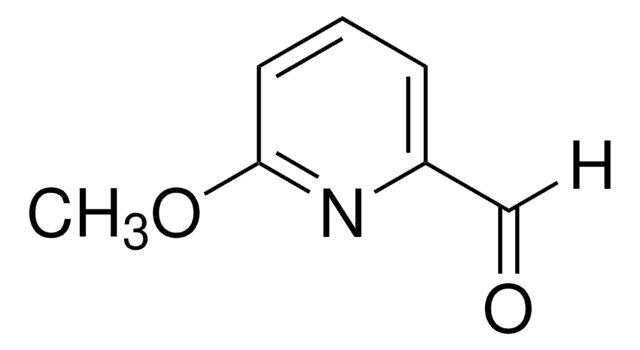P62003
2-Pyridinecarboxaldehyde
99%
Synonym(s):
Picolinaldehyde, Pyridine-2-aldehyde
About This Item
Recommended Products
Quality Level
Assay
99%
refractive index
n20/D 1.536 (lit.)
bp
181 °C (lit.)
density
1.126 g/mL at 25 °C (lit.)
storage temp.
2-8°C
SMILES string
[H]C(=O)c1ccccn1
InChI
1S/C6H5NO/c8-5-6-3-1-2-4-7-6/h1-5H
InChI key
CSDSSGBPEUDDEE-UHFFFAOYSA-N
Looking for similar products? Visit Product Comparison Guide
Application
- To synthesize chitosan based bifunctionalized adsorbent.
- In the aldol addition reaction with pyruvate in the presence of 2-keto-3-deoxy-6-phosphogluconate aldolase (KDPG) catalyst to form (S)-4-hydroxy-2-keto-4-(2′-pyridyl)butyrate.
- In the condensation reaction with (S)-(−)-α-methylbenzylamine and (R)-(+)-α-methylbenzylamine to synthesize two chiral (S)-(−)- and (R)-(+)Schiff base compounds.
It can also be combined with thiosemicarbazide to form 2-pyridinecarboxaldehyde thiosemicarbazone ligand (L) which can further complex with Ni(II) and Cu(II) salts (MX) to form [M(L)2X2] complexes.
Signal Word
Danger
Hazard Statements
Precautionary Statements
Hazard Classifications
Acute Tox. 2 Inhalation - Acute Tox. 4 Oral - Eye Dam. 1 - Skin Corr. 1B - Skin Sens. 1
Storage Class Code
6.1A - Combustible acute toxic Cat. 1 and 2 / very toxic hazardous materials
WGK
WGK 2
Flash Point(F)
170.6 °F
Flash Point(C)
77 °C
Personal Protective Equipment
Certificates of Analysis (COA)
Search for Certificates of Analysis (COA) by entering the products Lot/Batch Number. Lot and Batch Numbers can be found on a product’s label following the words ‘Lot’ or ‘Batch’.
Already Own This Product?
Find documentation for the products that you have recently purchased in the Document Library.
Customers Also Viewed
Our team of scientists has experience in all areas of research including Life Science, Material Science, Chemical Synthesis, Chromatography, Analytical and many others.
Contact Technical Service











